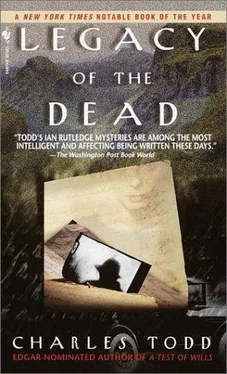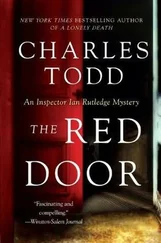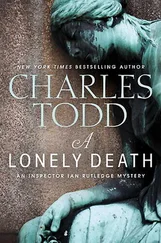Charles Todd - Legacy of the Dead
Здесь есть возможность читать онлайн «Charles Todd - Legacy of the Dead» весь текст электронной книги совершенно бесплатно (целиком полную версию без сокращений). В некоторых случаях можно слушать аудио, скачать через торрент в формате fb2 и присутствует краткое содержание. Жанр: Полицейский детектив, на английском языке. Описание произведения, (предисловие) а так же отзывы посетителей доступны на портале библиотеки ЛибКат.
- Название:Legacy of the Dead
- Автор:
- Жанр:
- Год:неизвестен
- ISBN:нет данных
- Рейтинг книги:5 / 5. Голосов: 1
-
Избранное:Добавить в избранное
- Отзывы:
-
Ваша оценка:
- 100
- 1
- 2
- 3
- 4
- 5
Legacy of the Dead: краткое содержание, описание и аннотация
Предлагаем к чтению аннотацию, описание, краткое содержание или предисловие (зависит от того, что написал сам автор книги «Legacy of the Dead»). Если вы не нашли необходимую информацию о книге — напишите в комментариях, мы постараемся отыскать её.
Legacy of the Dead — читать онлайн бесплатно полную книгу (весь текст) целиком
Ниже представлен текст книги, разбитый по страницам. Система сохранения места последней прочитанной страницы, позволяет с удобством читать онлайн бесплатно книгу «Legacy of the Dead», без необходимости каждый раз заново искать на чём Вы остановились. Поставьте закладку, и сможете в любой момент перейти на страницу, на которой закончили чтение.
Интервал:
Закладка:
Rutledge thought of Eleanor Gray, the suffragette chaining herself to fences and letting herself be dragged off to prison. “Mawkish” wasn’t a word he’d have chosen to describe her. Still, Oliver had a point to make. Rutledge nodded.
“Next question, then. What happened between crossing the border and meeting Fiona MacDonald, as she must have called herself then? Did our Miss Gray, for sake of argument, leave too late and never make it to her original destination? Women have been known to be wrong about their time!”
That was true. But Eleanor Gray had wanted to be a doctor. Would she have got it wrong?
“Yes, I can see the possibilities. That she felt ill and stopped for help. Or that something else had gone wrong with her plans.” He looked down at Oliver. “Glencoe isn’t necessarily where she died. If she is dead.”
“Oh, she’s dead, right enough. And those are her bones out there in the glen. Who would know better where to hide a victim than someone who’d grown up in the district? If I had a corpse on my hands, I’d take it to such a godforsaken place no one was likely to stumble over it until it was clean bones. And that’s just what the MacDonald woman did. The local police didn’t have any luck at all identifying the remains last year when they were discovered. If we hadn’t come along, she’d be without a name still.”
Hamish, angry, described Oliver’s ancestry and future destination in some detail. Highlanders were, as a general rule, creative in their cursing.
“A dangerous choice, wouldn’t you say?” Rutledge found himself defending Fiona MacDonald. “I’d have taken the body miles from where I lived.”
“How far could the accused go, burdened with a newborn child and a dead woman?” Oliver said thoughtfully. “Or turn it upside down-she might have felt a little safer with each passing year, when the body didn’t come to light and there was no hue and cry for a missing child. Knowing it was there, if she ever had to devise an account of finding the mother dead. But herself safely out of the picture here in Duncarrick, otherwise.”
Words that would come back to him later-but Rutledge said now, “No, I don’t see that. Why didn’t she tell you those clever lies when you first became suspicious of her?”
“Because she misjudged me. She thought we’d be satisfied tearing the inn apart and coming away empty-handed.” Oliver smiled. “She failed to see, didn’t she, that making a fool of me was a blunder! I’d stake my hope of promotion on that. And now all that’s left is to put a name to that corpse. Which is why you are here.” It was a friendly warning not to cross the lines into Oliver’s own patch. The smile faded. “If I were a vengeful man, now, I’d look forward to presenting the haughty Lady Maude with proof that her daughter is not only dead but bore a child out of wedlock to some unknown soldier. First time that’s happened in her family tree, I’ve no doubt.”
Rutledge ate a hurried lunch, then informed the woman at the hotel desk that he might be away for several nights but wished to keep his room.
Morag had seen to his laundry for him, but he had written a brief note to Frances in London asking her to send a larger case north. He handed that to the clerk to be mailed. It appeared that he was going to be in Scotland for some time. Like it or not. But he was damned if he’d go any farther north than the borders!
Heading west from Duncarrick and then bearing north, Rutledge made first for Lanark. There was no direct road to Brae. It was only a small village on the way to somewhere else. The browns and golds of September already colored the landscape. The open land, with few of the hedgerows that the English used to set off fields, had been made suitable for sheep rather than agriculture. The cramped and compact towns, so different from the picturesque villages farther south, seemed to be locked into a harder past. The people here, independent and far less class-conscious, shared a different history from the English, and it had marked them. Set me down on either side of the border, he told himself, and I would know instantly on what ground I stood, English or Scottish.
As Rutledge settled into the long drive, Hamish turned from his annoyance at Inspector Oliver’s obtuseness to his memories of Fiona MacDonald before the war. Rutledge tried not to heed them, but the words kept pushing aside his own thoughts.
They had known each other from childhood, Fiona and Hamish. She had been lively and intelligent even then, accustomed to games with her brothers and their friends, running barefoot in the summers, her long, dark hair and her skirts tangled with briars and straw. Her grandfather’s favorite, she had learned to read at an early age and to form her own opinions freely. As she grew into a woman of humor and warmth in the summer of 1914, Hamish MacLeod had asked her to marry him. Only he’d marched off to war within a matter of weeks, and in 1916 died in France, far away from Fiona and the Highlands, from everything he held dear.
Small wonder she’d been tempted to take a motherless child and love him as her own, to bring him up as she and Hamish might have brought up their brood. A legacy of the dead, a child with his name if not his blood.
In the trenches, where men talked of home and a lost, safer world, Hamish had drawn a picture of a caring woman, of laughter and trust and abiding affection, that a soldier had carried with him to war.
But Rutledge had seen something else in her-through his eyes, not Hamish’s.
He had seen strength in her, and the ability to look directly at the world. He had seen courage-and fear. He had seen a fierce longing for something to come out of the ashes of her heart. And now even that had been taken away.
She was everything, he realized suddenly, that Jean-whom he’d wanted to marry, who he’d believed cared for him-had never been. And for the first time since Jean had broken off their engagement, he was entirely free of her spell. As if scales had fallen from his eyes, he saw clearly how very different Jean’s conception of marriage had been from his. She had wanted a future that was protected and secure, accepted by society, applauded by her friends. A man in turmoil, his mind shattered, his future uncertain, was a terrifying prospect.
Fiona MacDonald knew what love meant, and what it cost, and what the war had taken from her. She would have loved Hamish if he’d come home scarred with burns, without his legs or his arms. She would have loved the man he’d become as well as the man he was.
She would even have loved him shell-shocked and consumed by nightmares Rutledge refused to follow that line of thought.
But his mind brought back other images, the women like Jean who came to the clinics and stared with horror at the ruins of husband or lover-he had once encountered one of them running out the door, face buried in her handkerchief, moaning in shock. And in the room behind her, a man with bandages where his face had been lay mute with clenched fists, unable to cry. There had been others who had accepted the living shell gratefully, with an intense sense of wonder that they had been among the lucky ones to have their soldier home again.
Fiona would have been among those…
That was the kind of courage she possessed. Was she also a murderess?
Rutledge felt the betrayal even as his mind framed the question. A betrayal of Hamish and of Fiona MacDonald.
He shut the war out of his mind and tried to concentrate instead on what lay ahead.
Fiona had left her grandfather’s home and moved south to Brae.
But why Brae?
“Because it was different from the glen,” Hamish answered unexpectedly. “It held no memories. Of her grandfather, of me. Of her brothers who had died.”
Читать дальшеИнтервал:
Закладка:
Похожие книги на «Legacy of the Dead»
Представляем Вашему вниманию похожие книги на «Legacy of the Dead» списком для выбора. Мы отобрали схожую по названию и смыслу литературу в надежде предоставить читателям больше вариантов отыскать новые, интересные, ещё непрочитанные произведения.
Обсуждение, отзывы о книге «Legacy of the Dead» и просто собственные мнения читателей. Оставьте ваши комментарии, напишите, что Вы думаете о произведении, его смысле или главных героях. Укажите что конкретно понравилось, а что нет, и почему Вы так считаете.












